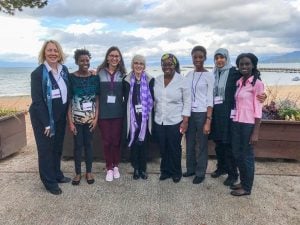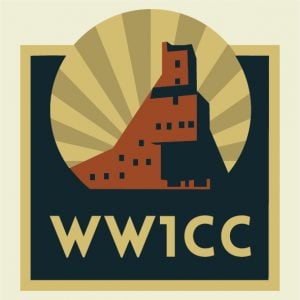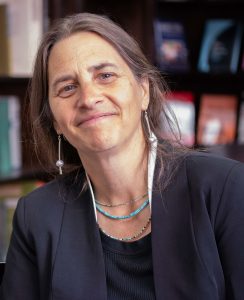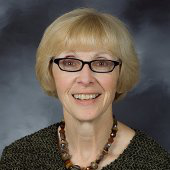 Stefka Hristova, associate professor of digital media, has published a new paper titled “Charting the Territory: Space and Power in the Iraq War” in ACME: An International Journal of Critical Geographies. She argues that the 2007 mapping and walling of Baghdad’s neighborhoods “exemplifies the materialization of the cell technique, and Carl Schmitt’s articulation of three modes of empty space in relation to territory”; and that “the walling process was an attempt to produce what [she] call[s] a ‘continuous security’, predicated upon the assumption of a population’s characterized belonging to the circumnavigated territory.”
Stefka Hristova, associate professor of digital media, has published a new paper titled “Charting the Territory: Space and Power in the Iraq War” in ACME: An International Journal of Critical Geographies. She argues that the 2007 mapping and walling of Baghdad’s neighborhoods “exemplifies the materialization of the cell technique, and Carl Schmitt’s articulation of three modes of empty space in relation to territory”; and that “the walling process was an attempt to produce what [she] call[s] a ‘continuous security’, predicated upon the assumption of a population’s characterized belonging to the circumnavigated territory.” Stefka Hristova, associate professor of digital media, has published a new paper titled “Charting the Territory: Space and Power in the Iraq War” in ACME: An International Journal of Critical Geographies. She argues that the 2007 mapping and walling of Baghdad’s neighborhoods “exemplifies the materialization of the cell technique, and Carl Schmitt’s articulation of three modes of empty space in relation to territory”; and that “the walling process was an attempt to produce what [she] call[s] a ‘continuous security’, predicated upon the assumption of a population’s characterized belonging to the circumnavigated territory.”
Stefka Hristova, associate professor of digital media, has published a new paper titled “Charting the Territory: Space and Power in the Iraq War” in ACME: An International Journal of Critical Geographies. She argues that the 2007 mapping and walling of Baghdad’s neighborhoods “exemplifies the materialization of the cell technique, and Carl Schmitt’s articulation of three modes of empty space in relation to territory”; and that “the walling process was an attempt to produce what [she] call[s] a ‘continuous security’, predicated upon the assumption of a population’s characterized belonging to the circumnavigated territory.” L. Syd M Johnson co-authored “Neuroethics Questions to Guide Ethical Research in the International Brain Initiatives,” published in Neuron. The paper is a product of the first Global Neuroethics Summit, held October 2017 in Daegu, South Korea.
L. Syd M Johnson co-authored “Neuroethics Questions to Guide Ethical Research in the International Brain Initiatives,” published in Neuron. The paper is a product of the first Global Neuroethics Summit, held October 2017 in Daegu, South Korea.
 L. Syd M Johnson was a delegate representing the National Institutes of Health (NIH), Brain Research through Advancing Innovative Neurotechnologies (BRAIN), Initiative Neuroethics Working Group at the Global Neuroethics Summit in Seoul, South Korea, Thursday through Sunday, Oct. 11-14.
L. Syd M Johnson was a delegate representing the National Institutes of Health (NIH), Brain Research through Advancing Innovative Neurotechnologies (BRAIN), Initiative Neuroethics Working Group at the Global Neuroethics Summit in Seoul, South Korea, Thursday through Sunday, Oct. 11-14.
 Michigan Tech Humanities graduate students and professors presented scholarly work at the annual Conference of the Organization for the Study of Communication, Language, and Gender in Lake Tahoe, Nevada October 3-6, 2018.
Michigan Tech Humanities graduate students and professors presented scholarly work at the annual Conference of the Organization for the Study of Communication, Language, and Gender in Lake Tahoe, Nevada October 3-6, 2018.
Masters Graduate student Nancy Achiaa Frimpong presented “Skin Colour on Sale: Advertising and Postfeminism”. Doctoral Graduate student Nada Mohammad Alfieir presented “‘I Didn’t Understand Anything!’ A Muslim Mother’s Narrative Reflections on Privacy, U.S. Sex Education, and a Daughter’s Denials”. Doctoral Graduate student Sara Potter presented “Motherhood as a Jointly Constructed Narrative”. Doctoral Graduate student Modupe Yusuf presented “African Women as Symbols of Feminist Persistence”. Ph.D. candidate Toluulope Odebunmi presented “Women and Politics in West Africa: An Analysis of Feminist Criticisms Against Liberia’s Ellen HJohnson Sirleaf”. Ph.D. candidate Nancy Henaku presented “Resistance, Discursive Activism and Gender Politics in Ghanaian Social Media: A Feminist Critical Discourse Analysis” and also served as the student representative on the OSCLG Board. Ph.D. candidates Nancy Henaku and Toluuope Odebunmi presented papers on the panel, “African Women Performing Persistence: Tales of Historical and Contemporary Contributions to Global Activism”.
Professor Victoria Bergvall presented “Missing Voices in the WEIRD Discourse of Gendered Neuroscience: Transnational Feminist Discourses of Nature and Nurture in Gender/Sex/Sexuality”. Professor Patty Sotirin presented “Militarized Mother Legacies: Talking with WWI Mothers”.
Pictured from left to right: Victoria Bergvall, Toluulope Odebunmi, Sara Potter, Patty Sotirin, Nancy Henaku, Modupe Yusuf, Nada Mohammad Alfieir, and Nancy Achiaa Frimpong.
 The Modern Languages Program will host a screening of the François Ozon’s 2016 film Frantz at 7 p.m. tomorrow (Oct. 4) in Walker 134. The screening is free and open to the public.
The Modern Languages Program will host a screening of the François Ozon’s 2016 film Frantz at 7 p.m. tomorrow (Oct. 4) in Walker 134. The screening is free and open to the public.
Film synopsis: In 1919 Quedlinburg, Germany, a young woman named Anna is still mourning the death of her fiance, Frantz Hoffmeister, in the Great War while living with his devastated parents. One day, a mysterious Frenchman, Adrien Rivoire, comes to town both to pay his respects to Frantz’s grave and to contact that soldier’s parents. Adrian explains that he knew Frantz and gradually he wins Anna and the Hoffmeisters’ hearts as he tries to connect with them. But the truth of his motives unveils no easy answers to their complex personal conflicts with each other and the dead man linking them (from IMDB pro).
The screening is part of World War I in the Copper Country (WW1CC), an extensive program of events and exhibits commemorating the WWI Armistice. Partners include Michigan Technological University, the Carnegie Museum of the Keweenaw, and Finlandia University. WW1CC is made possible in part by a grant from the Michigan Humanities Council, an affiliate of the National Endowment for the Humanities. Any views, findings, conclusions or recommendations expressed in the WW1CC program do not necessarily reflect those of the NEH or the MHC.
 Three faculty members and a graduate student presented on various topics related to the First World War at the Armistice & Aftermath: a World War One Symposium. The symposium is part of the commemoration of the Copper Country’s involvement in WWI. Ramon Fonkoue presented on “Art and activism in Abel Gance’s film Jaccuse: Revisiting anti-war sentiment in French art and society a century later”. Dany Jacob’s presentation was titled “’Pour la France! Pour ma famille!’: Legacies in Rouad’s Champs d’honneurs”. Laura Fiss also presented on “Recalling the trenches from Club Window: Contrasting perspectives in Dorothy Sayers and P.G. Wodehouse”. Graduate student Edzordzi Agbozo presented on “World War One & Africa: Contesting history, nation, and identity in ‘Western Togoland’”.
Three faculty members and a graduate student presented on various topics related to the First World War at the Armistice & Aftermath: a World War One Symposium. The symposium is part of the commemoration of the Copper Country’s involvement in WWI. Ramon Fonkoue presented on “Art and activism in Abel Gance’s film Jaccuse: Revisiting anti-war sentiment in French art and society a century later”. Dany Jacob’s presentation was titled “’Pour la France! Pour ma famille!’: Legacies in Rouad’s Champs d’honneurs”. Laura Fiss also presented on “Recalling the trenches from Club Window: Contrasting perspectives in Dorothy Sayers and P.G. Wodehouse”. Graduate student Edzordzi Agbozo presented on “World War One & Africa: Contesting history, nation, and identity in ‘Western Togoland’”.
 Sarah Bell, Assistant Professor of Digital Media, has returned this Fall from The John W. Kluge Center at the Library of Congress in Washington D.C. where she was researching as Digital Studies Fellow. Her project was “Speak & Spell to Siri: A Media History of Voice Synthesis” as part of her book manuscript From Speak & Spell to Siri: A Media History of Voice Synthesis. Bell was also awarded previous fellowships from the Lemelson Center at the Smithsonian National Museum of American History, the Strong Museum of Play, Michigan Technological University’s Research Excellence Fund, the Computer History section of the Association for Computing Machinery, and the Institute for Museum and Library Services.
Sarah Bell, Assistant Professor of Digital Media, has returned this Fall from The John W. Kluge Center at the Library of Congress in Washington D.C. where she was researching as Digital Studies Fellow. Her project was “Speak & Spell to Siri: A Media History of Voice Synthesis” as part of her book manuscript From Speak & Spell to Siri: A Media History of Voice Synthesis. Bell was also awarded previous fellowships from the Lemelson Center at the Smithsonian National Museum of American History, the Strong Museum of Play, Michigan Technological University’s Research Excellence Fund, the Computer History section of the Association for Computing Machinery, and the Institute for Museum and Library Services.
 Dana Van Kooy has been awarded a 2018-19 Lewis Walpole Library Fellowship at Yale University for her book project, “Atlantic Configurations of Early Modernity and the Aesthetics of Disappearance.”
Dana Van Kooy has been awarded a 2018-19 Lewis Walpole Library Fellowship at Yale University for her book project, “Atlantic Configurations of Early Modernity and the Aesthetics of Disappearance.”
 Dana Van Kooy presented “Island(s) of Resistance: Configuring the Geographical Spaces of Atlantic History” at the Resistance in the Spirit of Romanticism conference at the University of Colorado, Boulder on September 6. Her essay was included on a panel about “Resistance around the Atlantic.”
Dana Van Kooy presented “Island(s) of Resistance: Configuring the Geographical Spaces of Atlantic History” at the Resistance in the Spirit of Romanticism conference at the University of Colorado, Boulder on September 6. Her essay was included on a panel about “Resistance around the Atlantic.”
 Patty Sotirin is a co-principle investigator on a project that has received a $1,000,000 research and development grant from the National Science Foundation. Adrienne Minerick (School of Technology) is the principal investigator. Sonia Goltz (School of Business and Economics), Audrey Mayer (School of Forest Resources and Environmental Sciences/Social Sciences) and Andrew Storer (School of Forest Resources and Environmental Sciences) are also Co/PIs on the project titled, “ADVANCE Adaptation AMP-UP Continuous Improvement Process to Transform Institutional Practices and Culture.” This is a three-year project.
Patty Sotirin is a co-principle investigator on a project that has received a $1,000,000 research and development grant from the National Science Foundation. Adrienne Minerick (School of Technology) is the principal investigator. Sonia Goltz (School of Business and Economics), Audrey Mayer (School of Forest Resources and Environmental Sciences/Social Sciences) and Andrew Storer (School of Forest Resources and Environmental Sciences) are also Co/PIs on the project titled, “ADVANCE Adaptation AMP-UP Continuous Improvement Process to Transform Institutional Practices and Culture.” This is a three-year project.